
The way the wind is blowing these days, it’s only natural to feel a bit of uncertainty. Our government is experiencing drastic changes, and many people are understandably concerned that essential programs they rely on, such as Medicaid, might face cuts or even disappear altogether. We don’t yet know how far this will go, but it’s clear that our once-stable institutions feel pretty shaky right now. And here’s the truth of the matter:
…when we can’t rely on institutions, we have to rely on each other.
In uncertain times community is crucial, and it’s essential to build and sustain community now more than ever.
What is “community” and why does it matter?
Community is more than physical proximity, community means connection; shared interests, experiences, and values unite communities across the world regardless of location. This is especially true in the digital age, where online communities can provide vital support and connection, especially for those who may have difficulty connecting in person. At its core, community is just connection on a larger scale.
Strong communities matter because they are resilient and ready to act, even when institutions falter. For instance, after a natural disaster neighbors often unite, sharing food, lending generators, offering shelter, and checking in on each other while awaiting official help. Our survival often hinges on how well we cooperate and connect.
Besides, unless you’re out camping solo in the wilderness, we all depend on one another in various ways. None of us can go it alone, especially when it comes to mental health. We all crave connections, a sense of belonging, and the feeling that we are loved and cared for. It’s important to support each other—after all, that’s what community is all about!
But isn’t Mental Health Minnesota an institution, too?
While Mental Health Minnesota might be seen as an organization, at our heart we’re just a community of passionate individuals united by a common cause: ensuring everyone’s mental health needs are met. No single person defines who we are, which means whether you’re facing mental health challenges, on the road to recovery, or simply supporting the cause, you’re an integral part of OUR community. As the “voice of lived experience,” we make sure that the experiences and insights of those who have been there influence everything we do. That’s why our Warmline staff have personal experience with mental health struggles, and it’s why we advocate for individual rights and autonomy. We truly value your presence and see you as an essential part of who we are.
Community is a verb
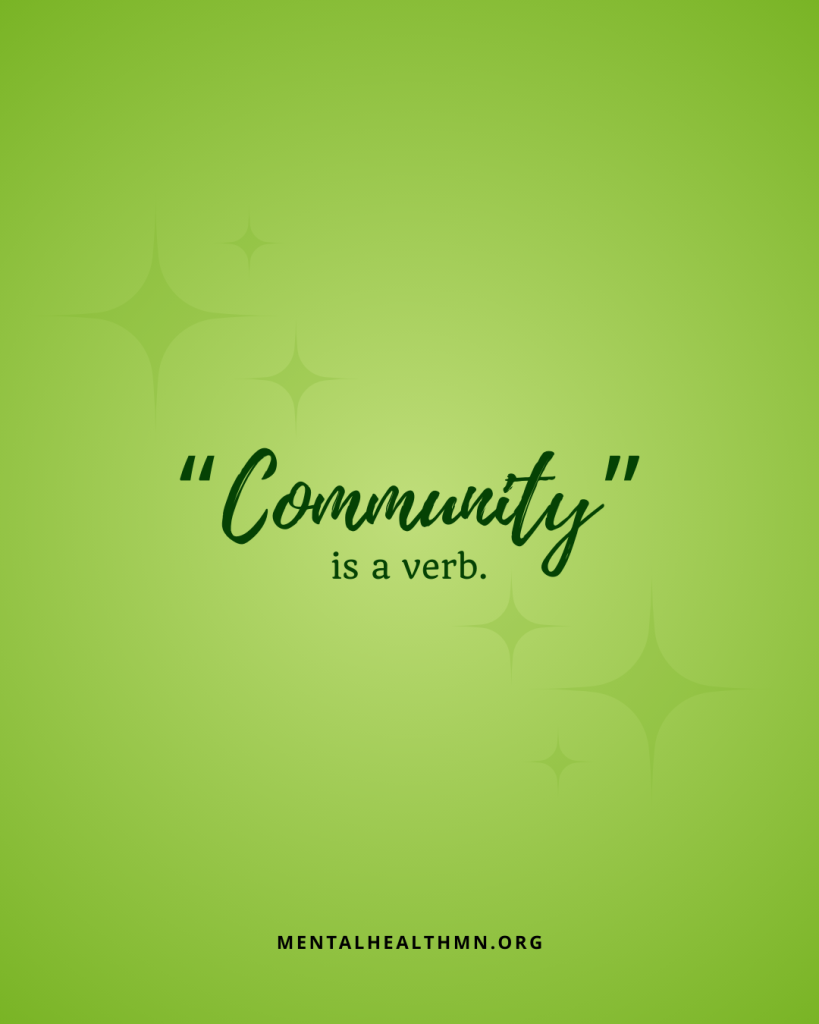
The world may seem vast, but we’re all aboard this big ship together. So, what do you do when the ship starts to sink? You have two options: learn to swim or teach someone else how to do it. When you teach others, they can pass it on, creating a ripple effect until everyone knows how to navigate the waters below—that’s community in action! Community can take many forms, whether it’s sharing resources, exchanging knowledge and skills, offering emotional support and connection, or collaborating to solve problems together (because two heads are definitely better than one!). The reality is that no matter who you are, you have something valuable to share.
Another great aspect of community is how our strengths can complement each other’s weaknesses, and vice versa. Community is all about give and take, and as the saying goes, “no man is an island,” and collaboration is vital. Nobody (yes, NOBODY) excels at everything, and that’s perfectly fine—it’s okay to lean on someone else’s expertise. If you’re an imaginative thinker who struggles with details while your coworker loves working with spreadsheets, why not divvy up the tasks so both of you can focus on using your strengths? Remember, it’s absolutely okay to be imperfect; that’s one of the reasons we rely on one another. No matter your flaws, you have something valuable to contribute—so share what you can and don’t be hard on yourself for what you can’t. Community is as much about receiving support as it is about giving it. It’s completely fine to use your community as a source of help. And remember, asking for what you need is not too much to ask; it doesn’t make you a “taker,” and you absolutely deserve the support of those around you.
How Mental Health Minnesota serves our community
Now more than ever, it’s critical to support non-profit organizations like ours, as our services are particularly needed in times of uncertainty. As a member of our community, we encourage you to lean on us—we’re here for you! All our services are free, anonymous, and confidential because we believe that everyone deserves access to mental health support and resources, no matter the circumstances. If you’d like to chat with someone who understands, feel free to connect with our Warmline for pressure-free conversations. For teens and young people, we also have our We Can RELATE Chatline to offer support. If you’re unsure where to start or need help navigating the mental health system and finding resources, don’t hesitate to reach out to our Helpline. You can also explore our educational resources online, create a safety or wellness plan, or take a mental health screening. Additionally, we offer workshops and trainings, and our advocacy efforts at both state and national levels mean we’re working hard to ensure you receive the support you deserve.
Speaking of give and take…
If you appreciate what we do and would like to help us in our mission here are a few ways you can support our work or even get involved yourself:
Spread the word: The more people know about us, the more they can benefit from our services—after all, we’re here to serve our community! If you know anyone who might find our offerings helpful, don’t hesitate to spread the word! You can send them to our website, share our social media content, or we can even provide you with cards to hand out that promote what we do!
Fundraise: This month, we invite you to engage with YOUR community to help give back. Your financial support makes a real difference, allowing us to expand our services and provide essential mental health support to Minnesotans free of charge. If you’re interested in starting a fundraiser for Mental Health Minnesota, check out this link for an easy-to-read toolkit, links to the fundraising platform, and all the resources you’ll need to get going!
Donate: If organizing a fundraiser isn’t quite your thing, no problem! You can still make an impact by making a one-time donation or setting up a recurring donation here.
Share your story: Your story is important! Sharing it can empower both you and others, shining a light on our mental health journeys to provide hope and reduce stigma. If you’d like to share your story on our website and possibly be featured in our monthly newsletter, simply fill out the form here. To read the inspiring stories of others, follow this link.
Volunteer: We’re currently looking for individuals aged 18-25 to join our We Can RELATE teen and young adult chatline, responding to chats from 3 pm to 9 pm on weekdays and 9 am to 3 pm on Saturdays. If you’re interested, you can sign up here. To stay in the loop about future volunteer opportunities, please fill out the form here.
Ways to build community, especially if you struggle with connection:

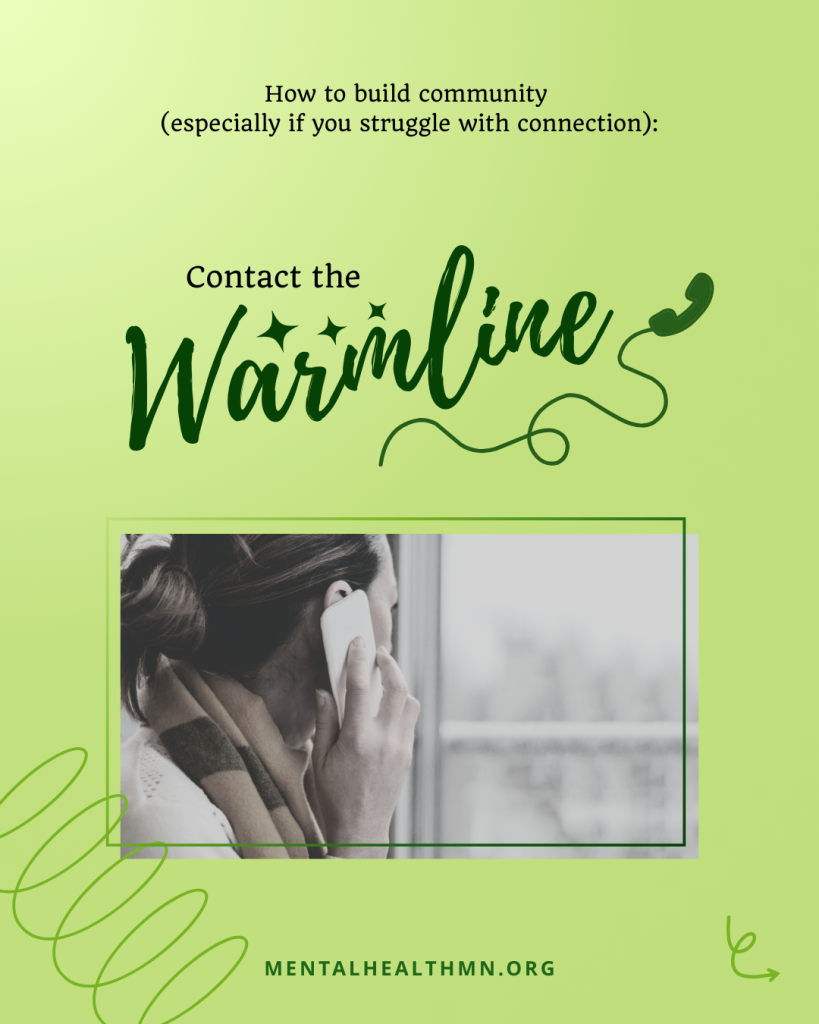
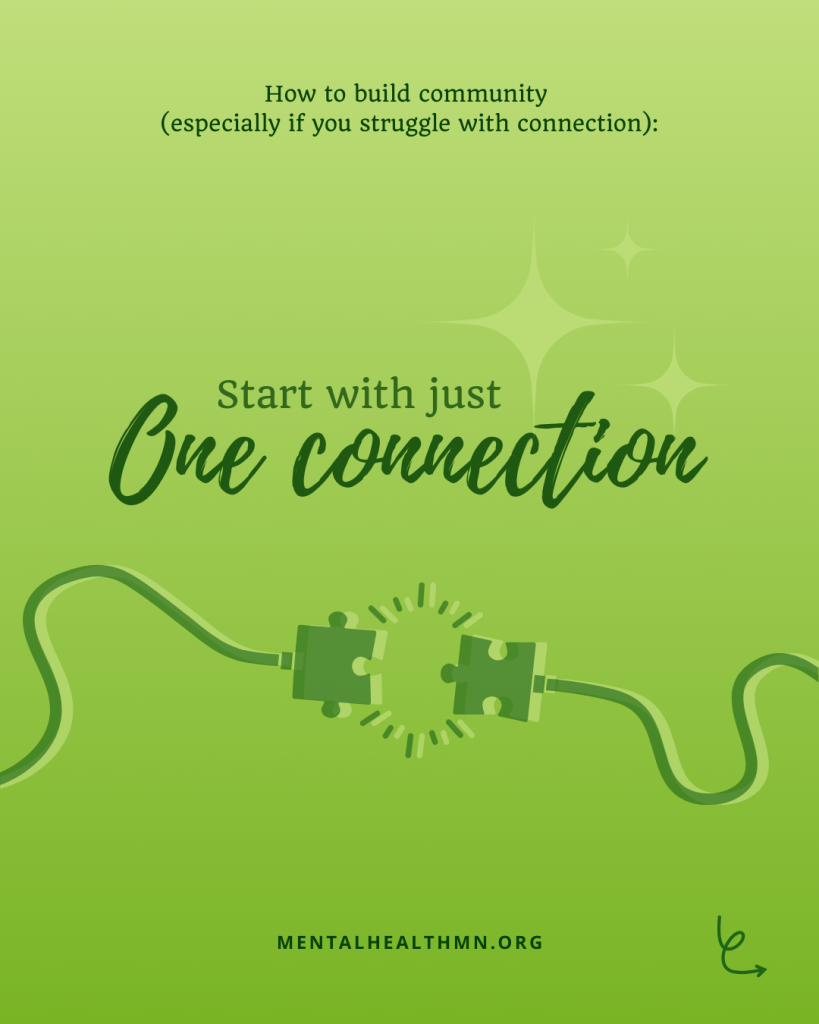
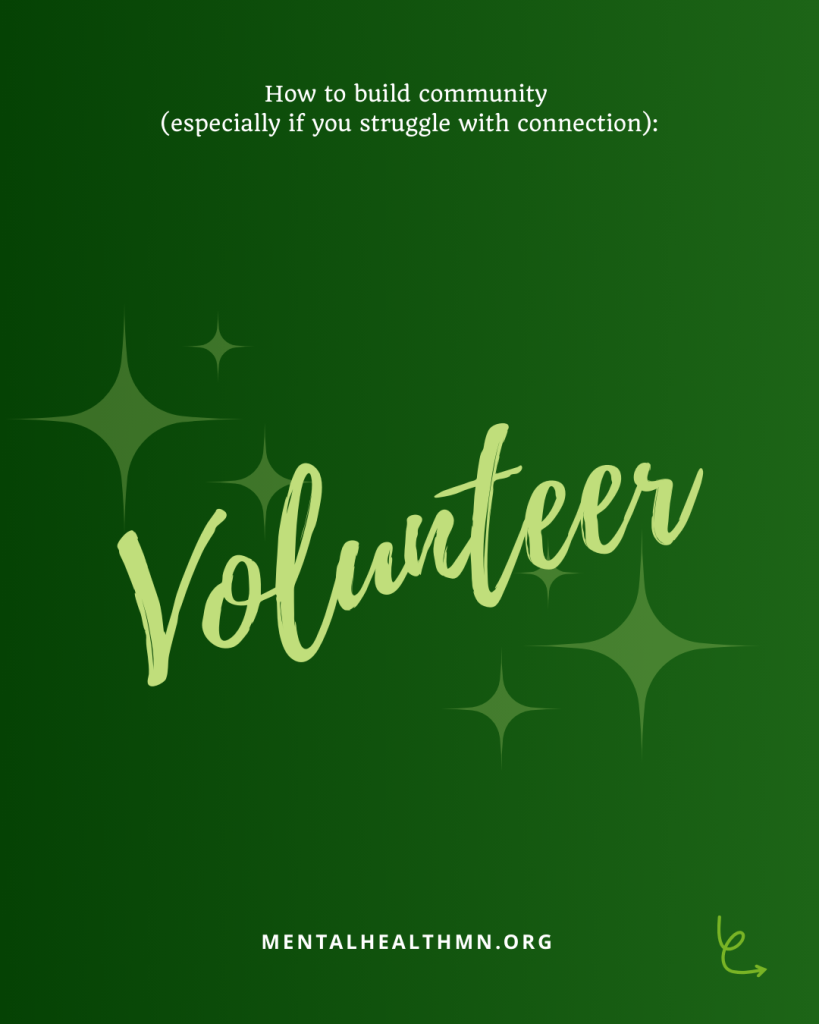
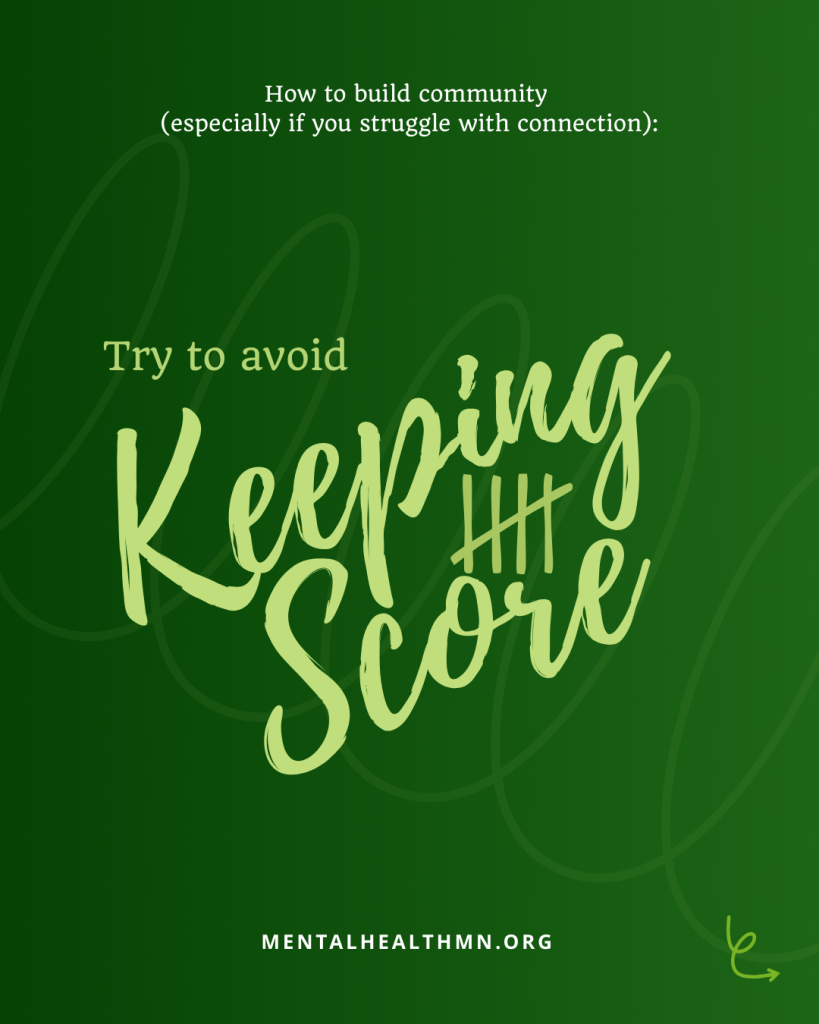
- Look for similarities, not differences: The very essence of the word “community” comes from “common.” It can be really helpful to focus on what we share with others. This approach reminds us that we’re not alone; there are plenty of people who have felt just as we do and can truly understand our experiences.
- If you’re feeling isolated, don’t hesitate to reach out to the Warmline for a casual chat and a friendly touchpoint: Our Peer Support Counselors are trained and bring their own lived experiences to the table. They’re genuinely eager to be there and support you.
- Start with just one connection: Community begins with two people having a conversation about shared interests. Remember, this isn’t high school—you don’t need to blend in with the popular crowd, nor do you have to be surrounded by crowds 24/7. It’s not about popularity; it’s all about those authentic connections, which take time to cultivate. Invest in one person today, and you’ll be doing a service to both yourself and them.
- Volunteer: It’s easy to feel a bit powerless at times, so when things seem tough, reclaim your strength by helping others. Giving back can be both empowering and a wonderful way to build community, reminding you of your value and nurturing a sense of belonging.
- Try to avoid keeping score: Instead of worrying about making sure everything balances perfectly, focus on meeting needs. Yes, there will be moments when you need to set boundaries and stand firm, but there are also times when extending a little trust is worth it. It can be tough when you’ve been hurt in the past, but don’t let that stop you from engaging in activities that can boost your happiness right now. There are truly wonderful people out there, and the only way to connect with them is to step outside your comfort zone.
Conclusion
When cracks in the foundation start to show, it’s only natural that people begin to slip through. Just like a trapeze artist depends on a safety net, the communities surrounding us are our safety net. They play a vital role in providing support, and by working together, we can strengthen these connections so that no one falls through the cracks.
It can be scary when institutions let us down, and that’s why it’s important to remember that you’re not alone — we’re here for you. There’s a natural human ability for collaboration and mutual support. Sure, challenges can bring out the worst in people, but they also offer a chance for our best selves to shine through. So this is a reminder to embrace kindness when times are hard. Today, turn off the news for a minute and reach out to someone. It could be your mom, a sibling, a child, an old friend, or even a Warmline Counselor — anyone! Then take the time to listen and remember that we’re all navigating the same waters; it’s time to help each other learn how to swim.